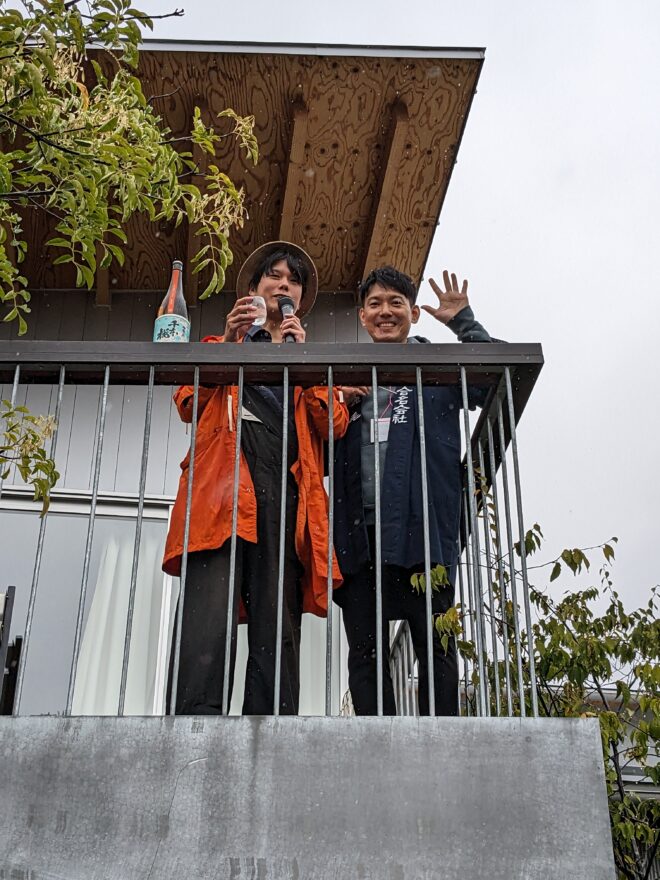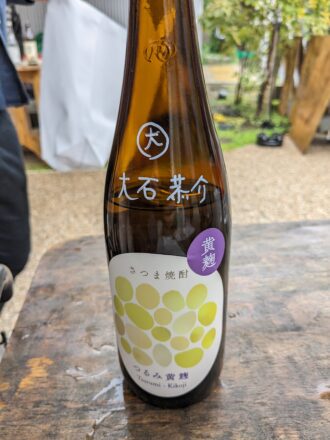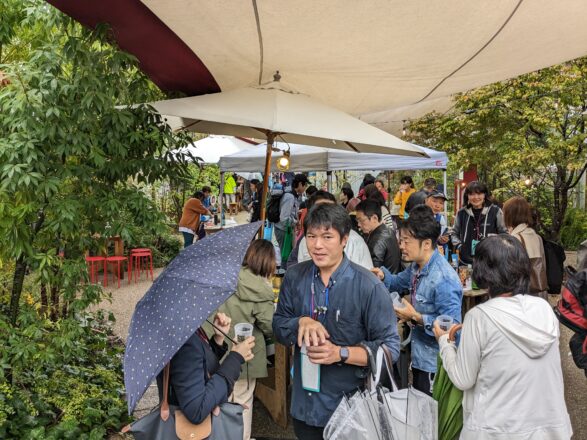Shochu Enkai is a very different kind of shochu event. This year’s was held on a rainy October 9, 2023, but plenty of shochu fans turned up in a show of force anyway. At the invitation of all-around drinks writer/influencer Marico Kojima, I had the opportunity to attend for the first time. The Shochu Enkai’s novel approach to a tasting event turns it into an exceptionally social one (“enkai” is Japanese for a party, usually where participants share food and drink).
Allow me to explain.
Instead of visiting various distillery booths to sample their products, you’re assigned a distillery upon entrance. Head over to the booth to familiarize yourself with your assigned distillery, then collect your bottle from that distillery.
That’s right, every attendee received a 720ml or 900ml bottle of shochu from the get-go.
You don’t just nurse that one bottle the whole time. The idea is that you’re supposed to talk to other attendees and share bottles with them. I pour you a sample from my bottle, and you get one from mine. Maybe we strike up a conversation; perhaps we don’t. Maybe you convince me to try a particular way of drinking that particular shochu: water, ice, and soda were all readily available for no cost.
Thinking through it, would it be possible with any other liquor category? Beer, wine, sake… one bottle is unlikely to last very long. Conversely, if it were one of the 40% abv+ spirits categories (gin, whisky, brandy, agave stuff, etc), everyone would get hammered too quickly. Not to mention the cost of the latter.
I’d venture to say that this social-first format is only possible for shochu. It works very well: never before have I attended an event where you can approach a table full of randos, bottle in hand, looking to share. At least while somewhat sober. Look, we all meet new people at events like this, but it’s not necessarily by design.
Apart from the bottle sharing, the distillery booths had plenty to offer. Whisky festival attendees would find themselves right at home, as you can speak directly with the makers and try some of their less mainstream products.
Provided you collect enough stickers by exchanging samples with other attendees, you could even win a chance to get a caricature drawn by none other than fermentation expert Hiraku Ogura.
The list goes on: seminars by distillers, a craft cola booth, and even a unique selection of shochu-related books offered by B&B within the event’s venue, Shimokitazawa Bonus Track.
In all, eleven distilleries were present at the event:
- Kagoshima’s Oishi Shuzo
- Kumamoto’s Ohishi Shuzohjyo
- Miyazaki’s Kuroki Honten with the Osuzuyama Distillery
- Kumamoto’s Takada Shuzohjyo
- Kagoshima’s Tomita Shuzojo
- Kagoshima’s Nakamura Shuzoujo
- Amami’s (Kagoshima) Nishihira Distillery
- Hachijojima’s (Tokyo) Hachijo-kohatsu
- Miyazaki’s Yanagita Distillery
- Kagoshima’s Yamatozakura Shuzo
- Kagoshima’s Wakashio Distillery
That’s quite a lineup, not just geographically, but also in terms of the raw ingredients like sweet potato, barley, rice, and kokuto sugar.
My assigned bottle was Satsuma Shiro by Wakashio. Of course, the uber-popular GLOW was also on offer.
Having been to Kyushu a few times, one thing that always strikes me about local shochu culture is how ordering a bottle then sharing, is simply the default choice. It’s possible to do this in Tokyo, but it’s not nearly as commonplace.
Despite taking place in one of the Tokyo-est places in Tokyo (Shimokitazawa), Shochu Enkai captured that social vibe of shochu extremely well. Here’s to hoping the weather is better next year, but either way, I’ll see you there.
Hi there! I created and run nomunication.jp. I’ve lived in Tokyo since 2008, and I am a certified Shochu Kikisake-shi/Shochu Sommelier (焼酎唎酒師), Cocktail Professor (カクテル検定1級), and I hold Whisky Kentei Levels 3 and JW (ウイスキー検定3級・JW級). I also sit on the Executive Committees for the Tokyo Whisky & Spirits Competition and Japanese Whisky Day. Click here for more details about me and this site. Kampai!


















